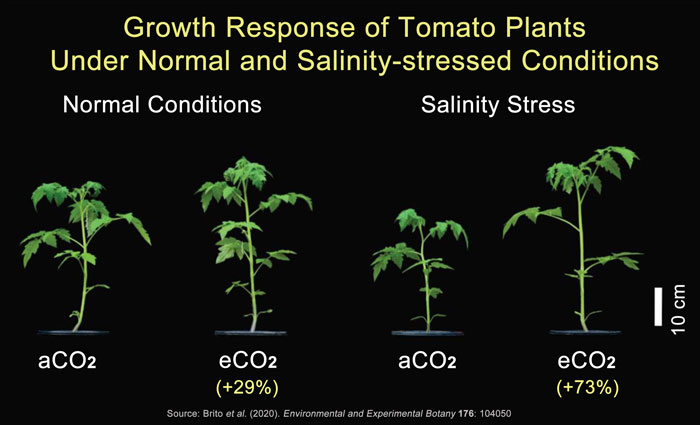| Tweet | Follow @co2science |
Paper Reviewed
Brito, F.A.L., Pimenat, T.M., Henschel, J.M., Martins, S.C.V., Zsögön, A. and Ribeiro, D.M. 2020. Elevated CO2 improves assimilation rate and growth of tomato plants under progressively higher soil salinity by decreasing abscisic acid and ethylene levels. Environmental and Experimental Botany 176: 104050, doi:10.1016/j.envexpbot.2020.104050.
Introducing their study, Brito et al. remind us that "soil and water salinity represent a serious challenge for world agriculture," as "salt hampers plant growth due to osmotic effects, ion toxicity, restriction of gas exchange capacity and nutrient imbalances in the cytosol." Consequently, crop yields in salt-stressed regions are far below that observed in non-stressed conditions.
However, the six-member Brazilian research team also notes "there is extensive evidence, obtained from experiments conducted in controlled environmental chambers, that the negative effects of salinity on plant growth may be mitigated by elevated CO2." And against this backdrop, Brito et al. set out to see if such mitigation indeed is the case for salinity-stressed tomato plants.
The work was conducted in open-top chambers inside a greenhouse at the Universidade Federal de Vicosa, Vicosa, MG, Brazil. There, tomato plants (Solanum lycopersicum, cv. Santa Clara) were subjected to treatments of either normal or salinity-stressed (+150 mM NaCl) conditions under either ambient (400 ppm; aCO2) or elevated (750 ppm; eCO2) atmospheric CO2 for a period of 21 days.
The results of the study revealed, not surprisingly, that salinity stress negatively impacted the growth of the tomato plants while elevated CO2 enhanced it (see Figure 1). More specifically, elevated CO2 increased the dry weight of plant leaves, stems and roots, resulting in an average 29% increase in total biomass under control conditions and a much larger 73% increase in total biomass under salinity-stressed conditions. Consequently, Brito et al. conclude by stating the obvious: "the inhibitory effect of salt stress on growth of tomato plant under ambient CO2 was overcome in plants grown under elevated CO2."
In light of the positive findings presented above, it is likely that crop yields in marginal salt-stressed locations will rise in the future thanks to increasing concentrations of atmospheric CO2, which help to mitigate the growth-retarding effects of this abiotic stress.

Figure 1. Growth response of tomato plants grown under ambient (aCO2) or elevated (eCO2) CO2 and normal or salinity-stressed conditions. The percentages in yellow text indicate the average percent increase in total plant biomass caused by elevated CO2 for a given salinity treatment (normal or salinity-stressed). Adapted from Brito et al. (2020).




